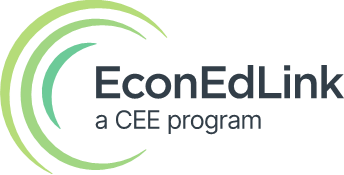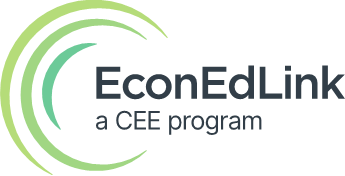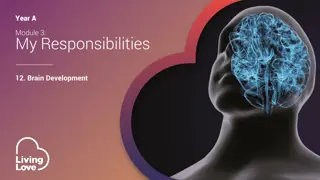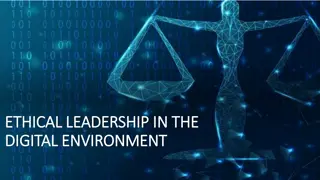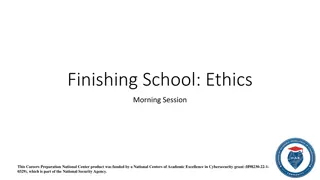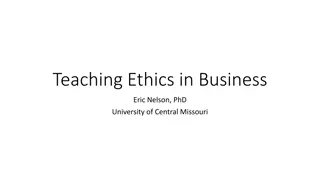Ethics of Efficiency in Decision Making
Explore the ethical implications of efficiency in various situations such as healthcare and resource allocation. Discuss the balance between effectiveness and ethical considerations.
Download Presentation

Please find below an Image/Link to download the presentation.
The content on the website is provided AS IS for your information and personal use only. It may not be sold, licensed, or shared on other websites without obtaining consent from the author. Download presentation by click this link. If you encounter any issues during the download, it is possible that the publisher has removed the file from their server.
E N D
Presentation Transcript
Is Efficiency Ethical?
What is efficiency? What does efficiency mean to you? What is the most efficient way to study for a test? What is the most efficient way to get from your home to school? Efficiency in economics is getting the most of some goal for the least (opportunity) cost 2
What is efficiency? More broadly, efficiency is getting more good without getting any more bad In this sense, efficiency must be an ethical concept But in real life, things are more complicated Allocation is the decision about what should be produced, how it should be produced, and who will consume it. It is the process of distributing something. 3
Life or Death? A doctor in a hospital has to make life-and-death decisions. How can we can measure the doctor s efficiency? 4
Activity 5.1: Solving a Public Health Problem You are a doctor who runs a hospital in an isolated rural area. You have 20 sick patients: 10 patients have Disease A and 10 patients have Disease B. Both diseases are painful and make the people unable to do daily tasks. Each patient with Disease A needs one dose of medicine to be cured. Each patient with Disease B needs two doses of medicine to be cured. Problem: You have only 10 doses of medicine for the rest of the year. Whom will you pick to get the medicine? Your job: Answer the questions in the Activity 5.1: Solving a Public Health Problem handout about how you would solve this problem 5
Activity 5.1: Discussion Questions How many people could you cure if you gave all the medicine to patients with Disease A? How many people could you cure if you gave all the medicine to patients with Disease B? Which option is the most efficient at healing people? What if you learn that patients with Disease A are all more than 80 years old, and patients with Disease B are all children. Would this change how you choose to allocate your medicine, and if so, why? If you had to personally decide how to allocate this medicine, what other factors (besides number of people helped and age) would you consider? 6
Positive and Normative Statements Economists must analyze public policy proposals and even provide recommendations. Part of that is collecting facts (positive statements) and weighing the importance of different goals (normative statements). For example, in the activity you could save 10 Disease A patients with the doses you had that is a fact and a positive statement. But whether you should save the 10 patients with Disease A (a normative statement) depends upon the goal of society. 7
What is efficiency? Defining the goal: What is most important? Society has many possible goals. These include preserving freedom, maintaining national security, improving standards of living, equality, and providing opportunities for all citizens. In addition, economists often focus specifically on the goal of enhancing welfare. Welfare means the satisfaction of individual preferences gaining happiness, good fortune, or well-being. 8
What is Allocative Efficiency? Measuring success: How do we know we have achieved the goal of enhancing welfare? Allocative efficiency means that people are able to obtain what best satisfies their individual preferences, while not making anyone else worse off. If a dictator were to require everyone to buy only classical music, would this satisfy individual preferences? 9
An efficient choice is ethical if: 1. Your goal is ethical 2. Making this choice does not require one to give up a more important ethical goal. (That is, the opportunity cost of the choice is not more ethically important than your choice.) When making a choice, we define our goal, and then consider the alternatives. We must consider both the ends (outcome-based ethics) and the means (duty-based ethics) of our choices to determine if the action is right or wrong 10
Making an Efficient, Ethical Choice Outcomes-based ethics: a moral philosophy that discerns right or wrong action based on the consequences produced by the action. For example: A doctor would consider saving the most amount of people Duty-based ethics: a moral philosophy that discerns right or wrong based on the analysis of one s obligations. For example: A doctor would consider what is being given up when saving the most people. They would consider the lives saved child vs. adult, quality of life, etc. 11
Activity 5.2: Should the City Allow a Casino? Scenario: You are an economist who works for your city government. The city is thinking about allowing a casino to be built in order to create jobs. Your task: List all the possible ways a casino could create jobs (be appropriate). Based only on your analysis of jobs created, is a casino efficient for the goal of creating jobs? What else besides jobs created would determine if this is allocatively efficient? 12
Activity 5.3: The Town Hall Meeting Scenario #2: You are the same economist as in the previous scenario. You gave your report on casino jobs to the city government, but you feel that something is missing. You think that the city s goal of making jobs fails to consider other important goals. You decide to hold a town hall meeting to learn about the ethical views of the citizens as they think about the casino. 13
Activity 5.3: The Town Hall Meeting Opinions of citizens: Citizen 1: A casino would be jobs to the people and tax money for the city! It s what we need to bring life back to our town! Citizen 2: A casino would cause gambling addiction for many of our citizens. It would also bring more crime. Gambling is no way to build a virtuous citizenry! Citizen 3: Gambling is fun. Why are we even voting on this? No one can tell me what I should do with my money! The casino and the people should have the freedomto do what they want! Citizen 4: Casinos make money on poor and lower-middle-class people. Our city should support projects that lead to wealth equality, not the casino s false promises of getting rich. 14
Marginal Decision Making Marginal benefit is the added value from each additional unit of something that one chooses, while marginal cost is the decreased value from each additional unit of something one chooses. Marginal analysis is studying the production or consumption of each additional unit of something that brings value (or utility ). Market equilibrium is where quantity supplied and quantity demanded are equal; there is no shortage or surplus. As you evaluate the other comments made during the Town Hall, consider the costs and benefits. 15
Marginal Cost or Marginal Benefit? Let's evaluate each statement based on Marginal Analysis: Citizen 1: A casino would be jobs to the people and tax money for the city! It s what we need to bring life back to our town! Marginal Cost or Marginal Benefit? Citizen 2: A casino would cause gambling addiction for many of our citizens. It would also bring more crime. Gambling is no way to build a virtuous citizenry! Marginal Cost or Marginal Benefit? Evaluate the rest of the Citizen's statements on your handout. 16
Activity 5.3: The Town Hall Meeting What did you decide should we allow the casino? How did you use both facts and ethical beliefs to make your decision? Will all the citizens agree that your choice is the efficient choice? Why or why not? 17
Closure Efficiency is when we achieve a goal for the least cost. Efficiency is ethical when: we pursue an ethical goal, and we do not sacrifice more important ethical considerations Therefore, when there are competing ethical claims, it is unclear if a choice can be truly efficient. However, if we allow that a person s personal preferences can be ethical, than our choices can be both efficient and ethical. But that requires YOU to make choices you believe are right! Your ethics become part of your marginal benefit curve. 18
Assessment 5: How Do Ethics Affect Your Personal Decisions? When you are making a personal choice, your ethical beliefs can affect your decisions. Make a list of at least five ethical beliefs that you may consider when shopping. You can list more than five if you wish! Then use this list to complete the assessment worksheet. 19



